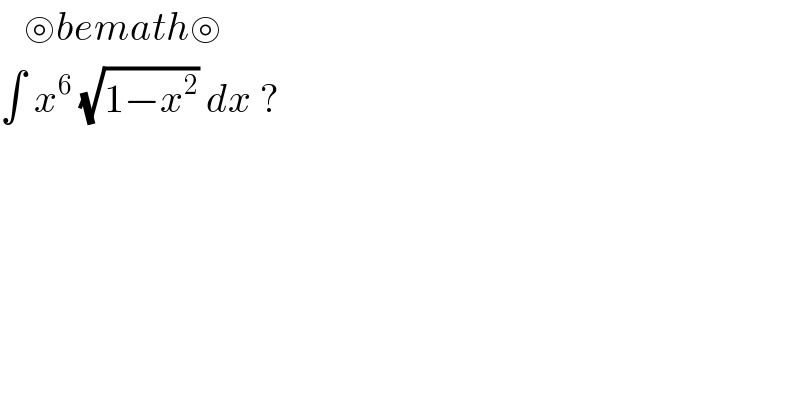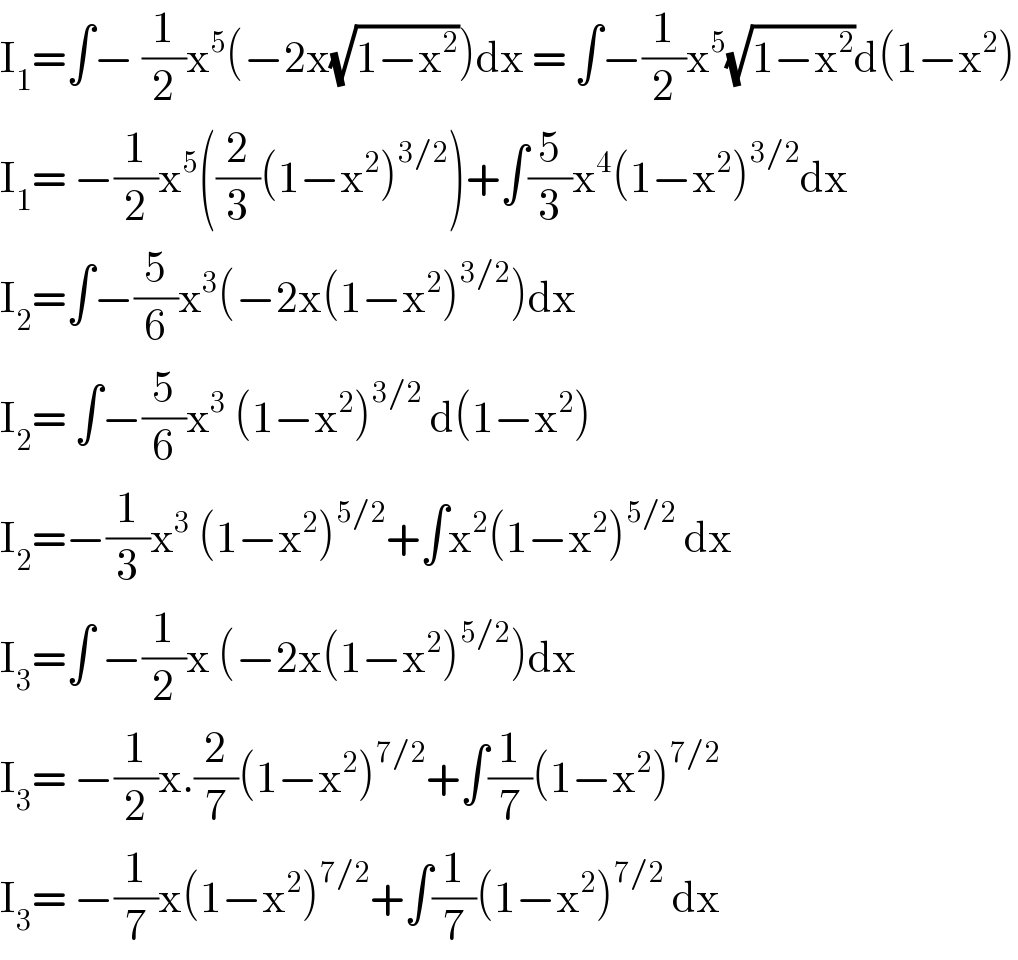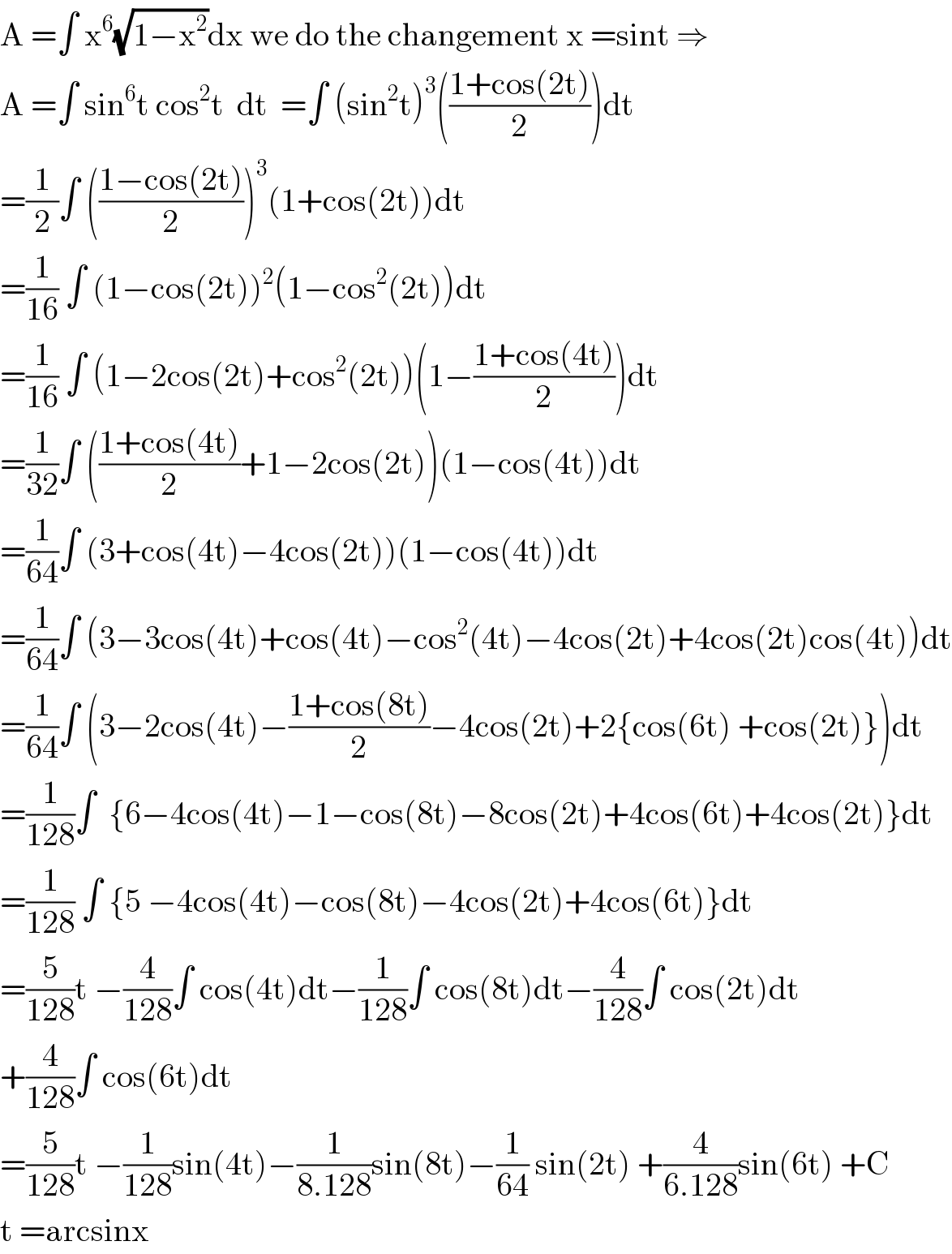
Question and Answers Forum
Question Number 107212 by bemath last updated on 09/Aug/20

Answered by Ar Brandon last updated on 09/Aug/20
![I=∫x^6 (√(1−x^2 ))dx , x=sinθ I=∫sin^6 θcos^2 θdθ=∫(sin^6 θ−sin^8 θ)dθ (z−(1/z))^6 =(2isinθ)^6 , z=cosθ+isinθ z^6 −6z^5 ((1/z))+15z^4 ((1/z^2 ))−20z^3 ((1/z^3 ))+15z^2 ((1/z^4 ))−6z((1/z^5 ))+(1/z^6 )=−64sin^6 θ z^6 +(1/z^6 )−6(z^4 +(1/z^4 ))+15(z^2 +(1/z^2 ))−20=−64sin^6 θ 2cos6θ−12cos4θ+30cos2θ−20=−64sin^6 θ (z−(1/z))^8 =(2isinθ)^8 1 7 21 35 35 21 7 1 1 8 28 56 70 56 28 8 1 z^8 +(1/z^8 )−8(z^6 +(1/z^6 ))+28(z^4 +(1/z^4 ))−56(z^2 +(1/z^2 ))+70=256sin^8 θ 2cos8θ−16cos6θ+56cos4θ−112cos2θ+70=256sin^8 θ ⇒I=−(1/(64))[(2/6)sin6θ−((12)/4)sin4θ+((30)/2)sin2θ−20θ] −(1/(256))[(2/8)sin8θ−((16)/6)sin6θ+((56)/4)sin4θ−((112)/2)sin2θ+70θ]+C I=(1/(256))[10θ−4sin2θ−2sin4θ+(4/3)sin6θ−(1/4)sin8θ]+C](Q107218.png)
Answered by bobhans last updated on 09/Aug/20

Answered by 1549442205PVT last updated on 10/Aug/20
![Set (1/x^2 )−1=u^2 ⇒2udu=−(2/x^3 )dx ⇒dx=−ux^3 du,(√(1−x^2 ))=ux,x^2 =(1/(u^2 +1)) F=−∫x^6 .(ux)(ux^3 )du=−∫x^(10) u^2 du =−∫((u^2 du)/((1+u^2 )^5 ))=−∫((u^2 +1−1)/((u^2 +1)^5 ))du =−∫(du/((1+u^2 )^4 ))+∫(du/((1+u^2 )^5 ))=I_5 −I_4 Apply the current formula: I_n =(1/(2a^2 (n−1))).(t/((t^2 +a^2 )^(n−1) ))+(1/a^2 ).((2n−3)/(2n−2)).I_(n−1) I_4 =(1/6).(u/((u^2 +1)^3 ))+(5/6)I_3 = (u/(6(u^2 +1)^3 ))+(5/6)[(1/4).(u/((u^2 +1)^2 ))+(3/4).I_2 ] =(u/(6(u^2 +1)^3 ))+((5u)/(24(u^2 +1)^2 ))+(5/8)I_2 =(u/(6(u^2 +1)^3 ))+((5u)/(24(u^2 +1)^2 ))+(5/8)[(1/2).(u/((u^2 +1)))+(1/2)∫(du/(u^2 +1))] =(u/(6(u^2 +1)^3 ))+((5u)/(24(u^2 +1)^2 ))+((5u)/(16(u^2 +1)))+(5/(16))tan^(−1) (u) I_5 =(1/8).(u/((u^2 +1)^4 ))+(7/8).I_4 .Therefore, F=I_5 −I_4 =(1/8).(u/((u^2 +1)^4 ))−(1/8)I_4 =(u/(8(u^2 +1)^4 ))−(1/8)[(u/(6(u^2 +1)^3 ))+((5u)/(24(u^2 +1)^2 ))+((5u)/(16(u^2 +1)))+(5/(16))tan^(−1) (u)]+C =(u/(8(u^2 +1)^4 ))−(u/(48(u^2 +1)^3 ))−((5u)/(192(u^2 +1)^2 )) −((5u)/(128(u^2 +1)))−(5/(128))tan^(−1) (u)+C Substituting u^2 +1=1/x^2 and u=((√(1−x^2 ))/x) we get: F=((x^7 (√(1−x^2 )))/8)−((x^5 (√(1−x^2 )))/(48))−((5x^3 (√(1−x^2 )))/(192)) −((5x(√(1−x^2 )))/(128))−(5/(128))tan^(−1) (((√(1−x^2 ))/x)) +C](Q107261.png)
Answered by mathmax by abdo last updated on 10/Aug/20

